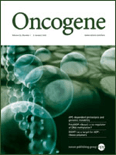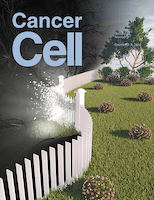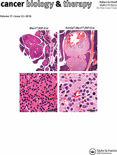
ONCOGENE
metrics 2024
Pioneering Genetic Discoveries in Oncology
Introduction
ONCOGENE is a premier peer-reviewed journal published by SpringerNature, serving as a crucial platform for innovative research within the fields of Cancer Research, Genetics, and Molecular Biology. With an impressive Impact Factor and a distinguished Q1 ranking across major categories, ONCOGENE publishes cutting-edge studies aimed at unraveling the complexities of cancer biology and genetic mechanisms. The journal has been a vital resource for the academic community since its inception in 1987, and it continues to foster rigorous scientific discussions and collaborations. Researchers, professionals, and students can access a wealth of critical insights and advances in cancer genomics and therapeutic approaches, cementing ONCOGENE’s role as a leading voice in the landscape of biomedical research. For comprehensive academic research, ONCOGENE remains an indispensable source of knowledge with contributions that significantly impact the evolution of cancer research and treatment strategies.
Metrics 2024
 2.33
2.33 6.90
6.90 7.50
7.50 370
370Metrics History
Rank 2024
Scopus
IF (Web Of Science)
JCI (Web Of Science)
Quartile History
Similar Journals

SEMINARS IN CANCER BIOLOGY
Pioneering insights for tomorrow's therapies.SEMINARS IN CANCER BIOLOGY is a leading journal dedicated to the dissemination of groundbreaking research in the field of cancer biology. Published by Academic Press Ltd - Elsevier Science Ltd, this esteemed journal plays a pivotal role in the academic community, boasting a prestigious impact factor and ranking within the Q1 category in Cancer Research for 2023. With an exceptional Scopus rank of #11 out of 230 in the realms of Biochemistry, Genetics, and Molecular Biology, it holds a significance that underscores its influence in advancing the understanding of cancer mechanisms and therapies. Established in 1990, the journal fosters a comprehensive platform for sharing high-quality and innovative research, critical reviews, and expert opinions aimed at professionals and researchers in the field. While not an open-access journal, it provides valuable insights that enhance the collective knowledge essential for the fight against cancer. For researchers, clinicians, and students, SEMINARS IN CANCER BIOLOGY is a crucial resource, paving the way for new discoveries and innovations in cancer treatment and prevention.

Cancer Biology & Medicine
Empowering Global Collaboration in OncologyCancer Biology & Medicine is a distinguished Open Access journal published by the China Anti-Cancer Association, dedicated to advancing research and understanding in the fields of Cancer Research and Oncology. Since its inception in 2012, the journal has provided a vital platform for the dissemination of high-quality research, evidenced by its impressive ranking within the Q1 and Q2 categories of oncology and cancer research as of 2023. With a significant impact factor and a Scopus ranking of #64 in Medicine/Oncology and #55 in Biochemistry, Genetics, and Molecular Biology, it plays a crucial role in shaping the future of cancer biology. By offering open access to its content, the journal ensures that pivotal research findings are readily available to researchers, professionals, and students globally, thereby fostering collaboration and innovation in cancer research. Situated in Tianjin, China, this journal is poised at the frontier of oncology research, making a significant impact through its rigorous peer-reviewed articles that address critical challenges in the field.

Cancer Communications
Connecting Researchers, Practitioners, and Patients in OncologyCancer Communications, published by WILEY, is a leading open-access journal that has positioned itself at the forefront of cancer research and oncology since its inception in 2017. With an impressive HIndex reflective of its scholarly impact and recognized in the Q1 category for both Cancer Research and Oncology as of 2023, this journal consistently ranks in the top echelons of its field, specifically at Rank #16/404 and Rank #13/230 in their respective categories on Scopus. Cancer Communications aims to disseminate cutting-edge research findings, innovative methodologies, and significant advancements in cancer treatments, thereby fostering a deeper understanding of oncology among researchers, healthcare professionals, and students. The journal operates under an Open Access model since 2018, ensuring that vital research is accessible to a global audience, thus enhancing collaboration and knowledge sharing necessary to tackle one of the most pressing health challenges of our time. Located in Hoboken, NJ, United States, and with a strong commitment to scientific excellence, Cancer Communications remains an essential resource for anyone engaged in the fight against cancer.

Molecular & Cellular Oncology
Innovating therapeutic interventions for a brighter future.Molecular & Cellular Oncology, published by Taylor & Francis Inc, is a vital academic journal dedicated to the exploration of cancer biology through the lens of molecular and cellular mechanisms. Since its inception in 2014, the journal has played a crucial role in disseminating innovative research findings that address the fundamental aspects of cancer research and molecular medicine. With its current ranking in Scopus placing it in the Q3 quartile for both Cancer Research and Molecular Medicine, the journal provides a platform for groundbreaking studies that push the boundaries of our understanding of oncogenesis and therapeutic interventions. Although the journal operates under a subscription model, its dedication to high-quality peer-reviewed research makes it an essential resource for researchers, professionals, and students aiming to contribute to or stay updated in the rapidly evolving field of oncology. As we approach the culmination of its converged years in 2024, Molecular & Cellular Oncology aims to continue fostering collaborations and insights that advance cancer research on a global scale.

Nature Cancer
Transforming Insights into Impactful SolutionsNature Cancer, published by NATURE PORTFOLIO, stands at the forefront of oncological research with a robust impact within the scientific community. As an esteemed journal with impressive rankings—#12 in Medicine (Oncology) and #8 in Biochemistry, Genetics and Molecular Biology (Cancer Research) according to Scopus, placing it within the 97th and 96th percentiles respectively—Nature Cancer boasts a Q1 category status in both Cancer Research and Oncology for 2023. The journal's commitment to advancing cancer research is crucial, promoting high-quality, peer-reviewed studies that address the complexities of cancer biology and treatment. By facilitating open access to impactful findings, Nature Cancer aims to foster collaboration and inspire innovative approaches among researchers, professionals, and students alike, making significant strides in the global fight against cancer. As this pivotal publication continues its converged years from 2020 to 2024, it heralds a future ripe with transformative insights and breakthroughs in the vital field of oncology.

NEOPLASIA
Leading the way in transformative oncology discoveries.NEOPLASIA is an esteemed open-access journal dedicated to advancing the field of oncology, published by Elsevier Science Inc. since 1999. With an impressive impact factor and recognition as a Q1 journal in Cancer Research for 2023, it holds a significant position within the scientific community, specifically ranking in the 74th percentile globally in the categories of Biochemistry, Genetics, and Molecular Biology. NEOPLASIA seeks to provide a comprehensive platform for innovative research, covering a wide array of topics in cancer biology, treatment methodologies, and therapeutic advancements. Researchers, professionals, and students are encouraged to utilize this resource, which is easily accessible to foster collaboration and stimulate progress in cancer research. As it converges its efforts towards the future of oncology, this journal is poised to remain at the forefront of transformative discoveries that shape our understanding and treatment of cancer.

CANCER CELL
Transforming Knowledge into Breakthrough TherapiesCancer Cell, published by Cell Press, represents a pinnacle of research in the fields of cancer research, cell biology, and oncology. With an impressive Impact Factor and ranking as Q1 in prestigious categories for both 2023 and previous years, this journal stands out as a vital resource for professionals and scholars dedicated to understanding the molecular underpinnings of cancer. Operating from Cambridge, MA, Cancer Cell has been an essential platform for innovative studies since its inception in 2002. Although it is not an Open Access journal, its rigorous peer-review process ensures that only the highest quality research is disseminated to the scientific community. Readers can expect to find a wealth of knowledge ranging from cutting-edge therapies to insights into tumor biology, thereby contributing significantly to the advancement of oncology. With rankings placing it among the top echelons of related fields—#2 in Cancer Research and #6 in Oncology—Cancer Cell is an indispensable reference for anyone committed to the fight against cancer.

Cancer Cell International
Pioneering Insights in Cancer Cell BiologyCancer Cell International, published by BMC, is a transformative open-access journal established in 2001, dedicated to advancing the field of oncology and cancer research. With its ISSN number not specified and an E-ISSN of 1475-2867, the journal proudly operates from the United Kingdom, located at CAMPUS, 4 Crinan St, London N1 9XW, England. Renowned for its rigorous peer-review process, Cancer Cell International has made significant strides, securing a Q2 ranking in Cancer Research and Q1 rankings in both Genetics and Oncology as of 2023. It ranks impressively in Scopus, featuring in the top quintile of Genetics (#37/347) and Oncology (#52/404), indicating its importance within the scientific community. The journal's broad scope caters to a diverse array of topics within cancer biology, making it an invaluable resource for researchers, professionals, and students seeking to stay at the forefront of cancer science. With a commitment to disseminating high-quality research, Cancer Cell International invites scholars to explore innovative findings and contribute to the collective effort of combating cancer.

Advances in Cancer Biology-Metastasis
Fostering Collaboration for Cancer Breakthroughs.Advances in Cancer Biology-Metastasis is an emerging journal published by Elsevier, aimed at advancing our understanding of the complexities of cancer biology, with a specific focus on the mechanisms and pathways related to metastasis. With an E-ISSN of 2667-3940, this journal offers a platform for researchers, professionals, and students in the fields of Cancer Research and Cell Biology to disseminate innovative findings and discuss novel therapeutic approaches. Though currently classified in the Q4 quartile across both Cancer Research and Cell Biology categories, the journal aspires to enhance its impact through rigorous peer review and high-quality publication. Positioned to cover the years from 2021 to 2024, it seeks to bridge gaps in foundational knowledge and promote collaborative research efforts that could pivot the current understanding of cancer metastasis. Researchers are encouraged to take advantage of this platform to advocate for advancements in cancer biology, making significant contributions that can influence both academic and clinical practices.

CANCER BIOLOGY & THERAPY
Exploring the depths of cancer biology for impactful therapies.CANCER BIOLOGY & THERAPY is a premier open-access journal published by Taylor & Francis Inc, dedicated to advancing the field of cancer research and treatment. Since its inception in 2002, the journal has evolved to provide a platform for innovative research and groundbreaking findings, addressing critical aspects of cancer biology, pharmacology, and molecular medicine. With an impressive impact factor and recognition as a Q2 journal in vital categories such as Cancer Research, Oncology, and Pharmacology, it holds significant standing in Scopus rankings, reflecting its influence and commitment to disseminating high-quality research. Offering researchers, professionals, and students a wealth of knowledge, CANCER BIOLOGY & THERAPY stands at the forefront of the fight against cancer, presenting the latest developments and therapeutic strategies vital for improving patient outcomes. Accessible to all since 2022, this journal is a must-read for anyone involved in the multifaceted arena of cancer research and treatment.